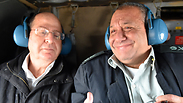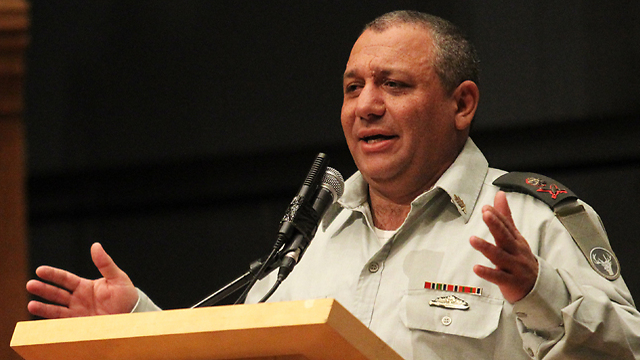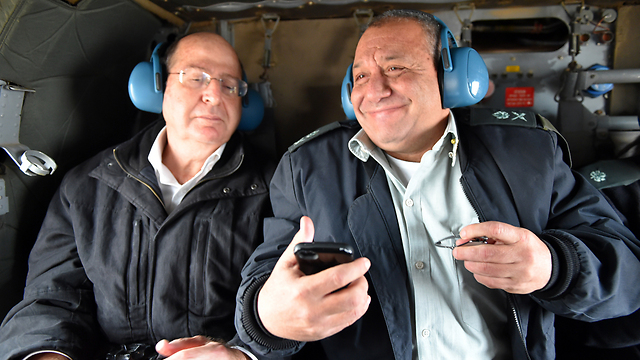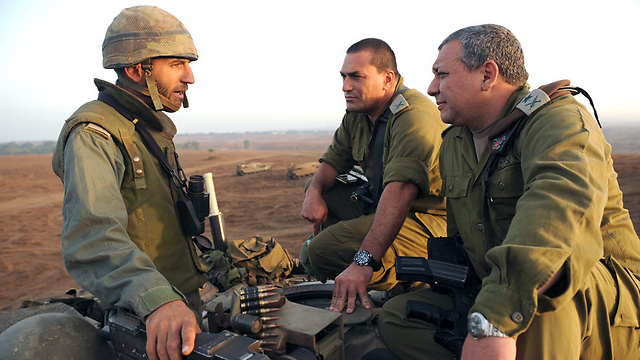
If the cabinet and its leader had bothered to listen to the annual intelligence assessment put together in recent weeks at the General Staff, this government probably would not have been quite so happy to disband. They certainly would not have dared to look quite so smug as they stared into the camera and told the Israeli public how responsible, conscientious and serious they are.
One person who was definitely present in one of the halls at the Gliliot military base to hear the information presented by intelligence chiefs to the Israel Defense Forces generals was soon-to-be chief of staff Major General Gadi Eisenkot. The portfolio of the latest threats falls on his shoulders and those of the army with impossible timing.The government decided to shut up shop, throw away the key and paralyze the security system for at least a year.
Eisenkot , who will take up his new post in mid-February 2015, does not know if the man who appointed him and is supposed to provide him with political backing will even be defense minister in the next government. Nor does he know if he could even be the confidante of another defense minister. He doesn’t know if the next government will stand behind the current government's commitments to the defense establishment, if it will head towards peace agreements, or if it will organize weekly festivals on the Temple Mount.
He doesn't know either what kind of suit of armor he'll have to fashion for the country, or if he has sufficient material for his purpose. He's stepping into the unknown, and he'll need to demonstrate a great deal of independence and make decisions to at least preserve the status quo. And for this, he will need balls of steel.
If Eisenkot dreamed for one moment of implementing his operational worldview in the early, critical days of his tenure, he'll have to think again. He may be able to present the General Staff with an outline of his plans, intentions and aspirations; but the army will be without an orderly and budgeted multi-year work plan in 2015 too.
The intelligence assessment presented at Glilot involved a discussion on the worsening situation in the West Bank and an analysis of the processes underway in the Gaza Strip. The dramatic news, however, pertains to the northern front. "Appears to be" just doesn't cut it any longer. The northern border fence is starting to shake too. Following years of relative stability, "his front" – Eisenkot's front, the northern front – is back on the potential-for-deterioration watch list.
Obstacle race
Inherent in most senior army officials who rose through the ranks along the northern front is an extra seed of suspicion, bordering on paranoia. Every explosive device discovered is immediately declared an IED-infested arena, until proven otherwise. Two shepherds close to the fence is an enemy surveillance mission; four shepherds – and a raid is imminent. And Eisenkot rose up through the ranks along this front from the very bottom, leopard-crawling through the thick undergrowth of Mount Dov as a private in the Golani Brigade.
He went on to fill a wide variety of roles – including countless combat situations and also battle wounds, one of which left a prominent scar on his forehead – until he reached the position of head of the command that oversees the Syria-Lebanon front.
Hassan Nasrallah was even the subject of one of the academic papers Eisenkot wrote for his master's degree, before his appointment as deputy chief of staff. Eisenkot examined the conduct of Hezbollah's secretary-general via an analysis of the man's public addresses. This attempt to get into the enemy's head is part of Eisenkot's obsessive preoccupation with intelligence.
Some commanders become addicted to their intelligence officers and see them as the Oracle at Delphi. Eisenkot's approach is the complete opposite. As GOC Northern Command, he would subject his intelligence officers to a flood of skeptical questions at every meeting he had with them. It's hard to believe that at 54, Eisenkot will change his old habits when it comes to his future dealings with the senior officials at Military Intelligence.
Because he is aware of the limitations of intelligence, one of the immediate issues on Eisenkot's mind is the effectiveness of the obstacle along the border. When it comes to the type of threat in the north with which Israel has been dealing in recent years, a confrontation with non-state military forces, the warning times are short and the situations tend to deteriorate rapidly.
Eisenkot would like to know if that system of fences along the northern border, loaded with electronic equipment at a cost of billions, is effective. Is the IDF utilizing these technologies in an efficient manner? Is the warning that the obstacle provides timely enough to allow the IDF to quickly contain an incident, before an infiltration turns into a day of firefights with Israelis killed and kidnapped? Has the technology allowed for manpower saving or does it require personnel that could be utilized in alternative defensive roles? And in general: Is the IDF's approach to day-to-day security activity along Israel's borders correct and effective?
As GOC Northern Command in 2011, Eisenkot himself stood by helpless as dozens of Palestinians and Syrians broke through the border fence and reached Majdal Shams. The incident sparked his demand to erect a barrier in the Golan Heights in keeping with the one set up along the Gaza border.
By the way, Eisenkot's wealth of experience in the labyrinth of internal politics at government ministries clearly came to light during the process of erecting the fence in the Golan Heights. The long years he spent rubbing shoulders with defense ministers and prime ministers as military secretary, and then as head of the Operations Wing at the General Staff, taught him where he could stretch procedures to the limit and where he shouldn't cross boundaries.
Eisenkot began the race to erect the obstacle even before getting the political echelon's approval. Today, everyone is applauding the fact that the fence was erected before the escalation along the Syrian border. Had things been done by the book, the fence may have been completed only after the leader of Jabhat al-Nusra on the Syrian side of the Golan had died of old age.
'Big blanket' theory
As Eisenkot sees things, the appropriate military response to the threat posed by these non-state organizations requires the use of maximum force, including ground maneuvers – not as support for air force and artillery fire, but as an equal-value component, at the start of the campaign. In the summer of 2006, during the early days of the Second Lebanon War, for example, he argued that bombing and shelling alone, particularly from the air, was not enough, and suggested putting an end to the small-scale IDF raids along the border and replacing them, from day one, with the deployment of large ground forces and a large-scale ground operation to finish off the campaign.
Insofar as the Palestinian arena is concerned, attempts to paint Eisenkot as someone who is aware of the limitations of force and will therefore hesitate to make use of it are not entirely accurate. A reality in which civilians are mixed up in every security incident does indeed require second and third thoughts before opening fire. But this is still a far cry from hesitation and a light touch. If we were still living in an age of conventional wars, between countries, Eisenkot would certainly appear on the list of the more militant commanders.
As commander of the IDF's Judea and Samaria Division during the second intifada, Eisenkot led a very aggressive doctrine against the terror organizations. He withdrew the tanks from the Palestinian cities and stopped the targeted killings by helicopter, both for the simple reason that it caused unnecessary harm to the civilian population, and also because he believed that breaking the enemy is also a mind thing: You can't defeat him from a distance. You need to go to his home, take him out of bed and do so every night, dozens of times, in dozens of places. He called it the "big blanket" theory – flood the area with forces to smother the fire.
Eisenkot is very task-minded – hence his ability to work in close cooperation with the Shin Bet security service and the Israel Police. As deputy chief of staff, for example, he provided the police with all the Border Police forces serving under the IDF's Central Command for the purpose of dealing with the riots in Jerusalem. In his view, if the area isn't flooded with police, quickly and with full force, we will find ourselves with four battalions of soldiers in the city.
Likeability and politeness are the secrets of Eisenkot's charm. He speaks to everyone – rank-and-file soldiers and generals – in the same tone, to the point, clearly, in a manner that evokes sympathy and trust. He never allows anyone to feel patronized, but the people with whom he converses never really know what he thinks of them.
Nor he is the kind of commander who inspires fear. He doesn't fly into unexpected fits of rage; and even when he is very angry and upset with one of his subordinates, he will explain his dissatisfaction in a very low tone and business-like manner. Perhaps this is why he hasn't acquired too many enemies. His patience for listening to people, allowing them to express their positions – out of politeness or interest – also comes with disadvantages; the General Staff meetings during his era will probably be unusually long.



















